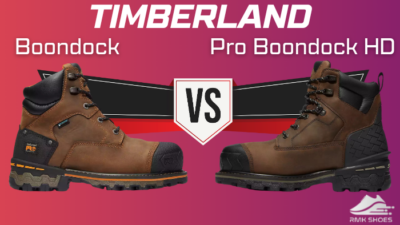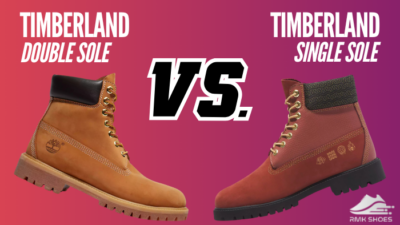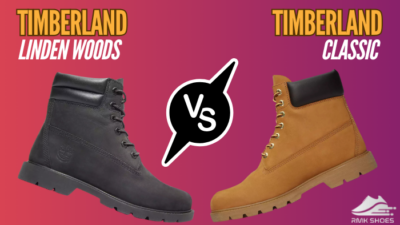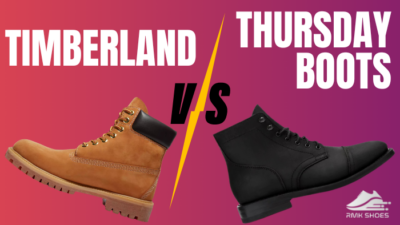Choosing the right winter boot to battle icy sidewalks without losing style can feel impossible.
Iconic outdoor brands Sorel and Timberland offer quality options built for snow days and mountain getaways alike – but how do you decide between them?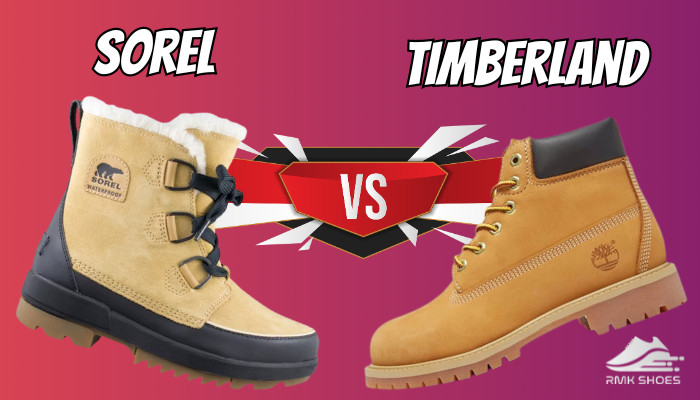
After testing several pairs from both brands this winter and relying on them for everything from apres-ski to snowshoeing, I break down how Sorel and Timberland compare across critical performance factors.
Therefore, let’s start the comparison.
Overview of Timberland and Sorel Boots Brand
Timberland and Sorel stand out as prominent names in footwear, each with its unique flair and reputation.
Timberland is renowned for its enduring outdoor footwear, while Sorel is acclaimed for its chic and practical winter boots.
Let’s explore what distinguishes these brands.
Timberland
Timberland epitomizes durability and craftsmanship, tracing back to 1952 with its iconic yellow work boots. Its product line has since expanded to encompass a range of footwear, apparel, and accessories.
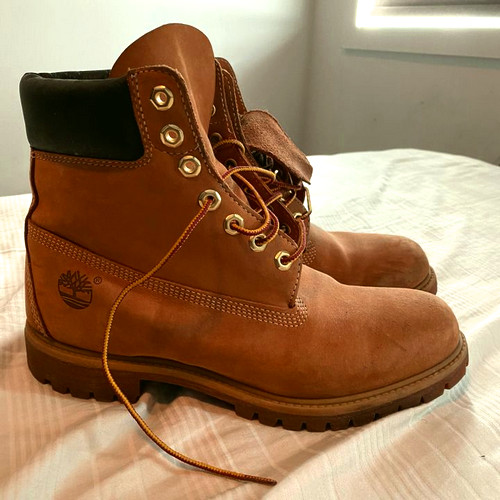
Timberland products are esteemed for their top-notch materials, robust build, and timeless style, whether you’re navigating rough terrain or urban landscapes.
Sorel
The brand specializes in winter footwear, with a legacy dating back to 1962. Sorel’s cold-weather boots blend fashion with function, engineered to withstand harsh elements with features like insulation, traction, and waterproofing.
From traditional snow boots to sleek modern designs, Sorel offers diverse styles, prioritizing quality and meticulous craftsmanship.
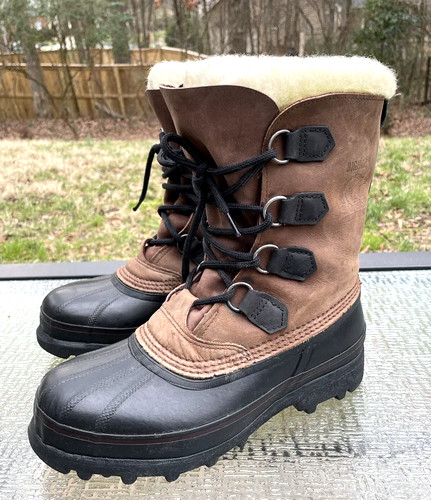
In essence, Timberland satisfies outdoor enthusiasts seeking durable and adaptable footwear, while Sorel supplies those searching for trendy yet practical winter boots.
Feature Comparison of Timberland and Sorel Winter & Snow Boots
Timberland and Sorel are influential brands in outdoor footwear. They provide a range of boots tailored for diverse weather conditions, terrains, and work requirements.
| Feature | Timberland | Sorel |
|---|---|---|
| Primary Focus | Durability, Versatility | Warmth, Protection |
| Key Materials | Premium Leather, Nylon, Nubuck | Felt, Nylon, full-grain leather, Seam-Sealed Construction |
| Waterproofing | Yes, various technologies | Yes, seam-sealed and waterproof materials |
| Insulation | Moderate to heavy, depending on the model | Heavy-duty, designed for extreme cold |
| Footbed | Anti-fatigue removable | Removable molded EVA |
| Outsole | Rubber Outsole with lugs | Molded Rubber |
| Traction | Excellent on various terrains | Good on most terrains |
| Sustainability | Growing commitment to recycled materials | Some eco-conscious options are available |
| Weight | Lighter than Sorel | Slightly heavy |
| Break-in | Requires more time to break in | Comfortable from the get-go, but better-fitting requires couple of wear |
| Durability | Great | Great |
| Size | Runs half-size larger | Runs true to size |
| Price Range | $110 – $260 (Winter models) | $105 – $200 (Winter models) |
| Style | Wide range, from classic work boots to casual and fashion-forward | Primarily functional, with recent stylish additions |
| Brand Reputation | Trusted brand known for quality and durability | Well-established brand with a reputation for stylish and functional winter footwear |
Now that we’ve covered the specs and features let’s explore the key distinctions between Timberland and Sorel boots. I’ll dig into specific details and features that distinguish these brands.
10 Primary Differences between Sorel and Timberland
Sorel specializes in winter boots, ensuring your feet stay cozy and protected in extreme cold. Timberland, on the flip side, offers a diverse range of footwear for various seasons and occasions.
However, I’ll focus on Timberland’s winter-ready options tailored for snowy and cold environments for this comparison.
With this context in mind, let’s explore the unique characteristics and features of snow boots from Sorel and Timberland. This will provide a comprehensive understanding of what each brand brings to the table regarding winter footwear.
Here are the main differences between Sorel and Timberland:
1. Best Winter Boots from Sorel and Timberland
Sorel boots, like the Caribou model, are renowned for their tough build and lasting quality. They’re crafted from waterproof full-grain leather and have removable inner boots for extra warmth and coziness.
These boots offer top-notch traction and can handle extreme temperatures down to -20°C.
Timberland also offers some great winter models. Their boots, such as the 6-inch Premium, boast waterproof nubuck leather uppers and seam-sealed construction, making them resistant to harsh weather conditions.
Featuring PrimaLoft insulation and a padded collar, Timberland boots offer both comfort and support. In my experience, they’re rated for temperatures as low as -10°C.
Some of the best winter boot models of Sorel and Timberland:
| Sorel | Timberland |
|---|---|
| Caribou™ Boot | Timberland® Premium 6-Inch Waterproof |
| SOREL Metro™ II Sneak | Mt. Lincoln Waterproof Insulated Boot |
| Scout 87'™ Mid Boot | Men’s Chillberg Snow Boot |
| Explorer Next™ Boot | Women’s Kinsley Boot |
| Buxton™ Lite Lace Boot | Converge Waterproof Boot |
| 1964 Pac™ Nylon Boot | Vibram Boot with GORE-TEX Bootie |
Sorel might have fewer models compared to Timberland, but the models are purposeful. Both brands have great product offerings to take care of the winter season.
2. Comfort and Fit
When it comes to comfort and fit, both Sorel and Timberland prioritize your all-day comfort with their winter boots. In my experience, each brand offers unique features for a comfy and well-fitting boot.
Sorel boots, exemplified by the Caribou model, deliver warmth and cushioning through their removable 9mm recycled felt inner boot and ensure exceptional arch support.
This feature guarantees proper foot support throughout the day, minimizing discomfort and fatigue.
Sorel’s generous fit caters to thicker socks or additional layers, while the lace-up closure system enables customized tightness for a secure and personalized fit.
Conversely, Timberland boots, like the 6-inch Premium, prioritize comfort with a padded collar that offers ankle cushioning and support.
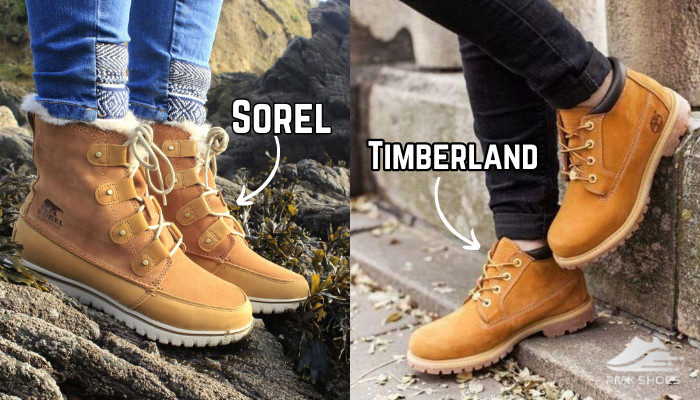
Timberland incorporates its exclusive Anti-Fatigue technology into select boots alongside a snug fit for stability. Also, the steel shank provides exceptional arch support and shock absorption, enhancing comfort for prolonged wear.
3. Durability Concerns
In my experience, both Sorel and Timberland boots are renowned for their durability.
Sorel often crafts its boots from tough materials like waterproof full-grain leather or suede and robust rubber outsoles.
This combination ensures protection and warmth even in the harshest weather.
It’s not uncommon for Sorel boots to endure a decade or more of heavy daily use.
Timberland, likewise, is celebrated for its durable construction. Their boots boast a rugged exterior and a snug fit, making them favorites whether bought recently or years ago.
Featuring sturdy rubber outsoles, Timberland boots offer exceptional traction. Their stitching and build are engineered to withstand rigorous wear, ensuring long-lasting toughness.
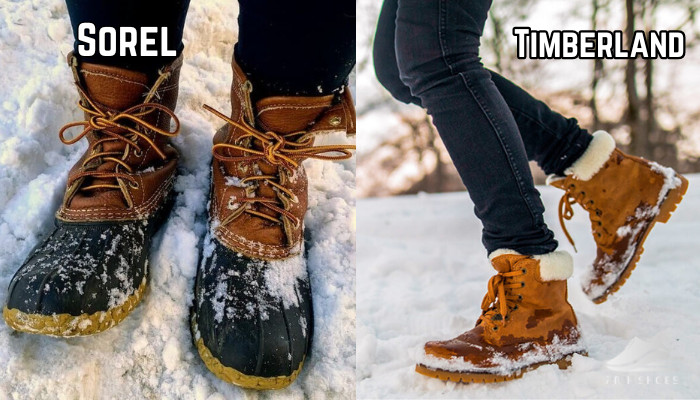
With proper upkeep, a premium pair of Timberland boots can endure anywhere from 3 to 8 years, depending on the style and frequency of wear.
4. Insulation Feature
Sorel boots are known for their exceptional insulation properties. They often feature thick and high-quality materials, such as felt, wool, or synthetic insulation, which provide excellent heat retention.
I remember wearing Sorels on a sub-zero camping trip, and my feet stayed blissfully warm even when temperatures plunged like a runaway snowball. However, this warmth comes with a trade-off – Sorels sometimes feel bulkier and less breathable.
Similarly, Timberland boots are designed with insulation in mind. They often use materials like PrimaLoft® or recycled materials that trap heat effectively without feeling overly bulky.
I own a pair of Timberlands that keep my feet cozy on moderate winter days, but it wouldn’t be my first choice for a cold expedition.
The insulation of the Sorel boots is superior. Some of the models Timberland might be on par with Sorel, but the most popular models of Sorel offer excellent insulation.
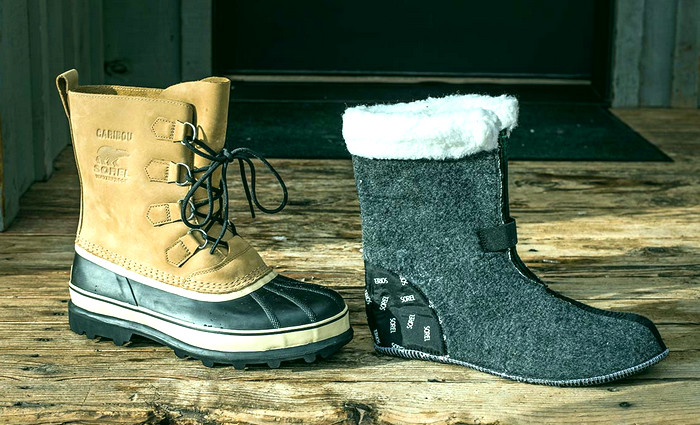
5. Slip Resistance and Waterproof Feature
Sorel and Timberland boots both prioritize slip resistance and waterproofing, albeit employing distinct methods to achieve these features.
Sorel boots are renowned for their innovative semi-slip-resistant soles, offering substantial grip suitable for various terrains. Additionally, these boots have Thinsulate insulation and are waterproof, perfect for snowy environments.
Conversely, Timberland boots are tailored for outdoor pursuits and come equipped with robust, slip-resistant rubber soles.
These soles deliver exceptional traction on snow, slush, or icy water surfaces.
Furthermore, Timberland uses a waterproofing process where the leather is silicon injected during manufacturing, and the tongue is sealed on both sides of the boot. This meticulous construction enables wearers to navigate puddles confidently without fear of damp feet.
6. Leather Quality
Sorel boots often blend different materials, which may include waterproof full–grain leather or suede. Full-grain leather, sourced from the top layer of the hide, is celebrated for its robustness and long-lasting nature.
Sorel boots crafted from full-grain leather have consistently shielded my feet from outdoor elements, ensuring they remain secure and cozy.
Additionally, these boots develop a charming patina over time, enhancing their individual allure.
Similarly, Timberland boots are meticulously fashioned from premium full–grain nubuck leather.
This leather variant is esteemed for its superior quality, durability, and resistance to water, stains, and abrasions. Timberland’s full-grain nubuck leather boots are durable and stylish, having withstood diverse weather conditions.
In my experience, the leather of the Timbs is slightly better compared to Sorel. Also, I find it easy to clean.
7. Sole Technologies
Sorel boots are renowned for their robust and waterproof outsoles, crafted from sturdy rubber. This feature grants you the confidence to traverse diverse surfaces without fretting over slips.
I’ve found that Sorel outsoles offer exceptional traction and resilience.
Furthermore, Sorel integrates Thinsulate insulation and removable molded EVA footbeds into their boots, elevating overall comfort and warmth. Consequently, your feet can remain snug even amidst chilly weather conditions.
In contrast, Timberland boots showcase innovative GreenStride™ technology, incorporating a renewable material derived from sugarcane and natural rubber.
I was particularly impressed by Timberland’s dedication to sustainability. The GreenStride™ technology delivers superb traction and durability and facilitates energy return within the sole as you move.
This translates to enhanced comfort and efficiency during walking with the Timberlands.
Moreover, Timberland boots feature a rubber outsole engineered to withstand the rigors of wear and tear, ensuring prolonged performance. The incorporation of an EVA midsole within the sole offers additional shock absorption and cushioning, augmenting the comfort of each stride.
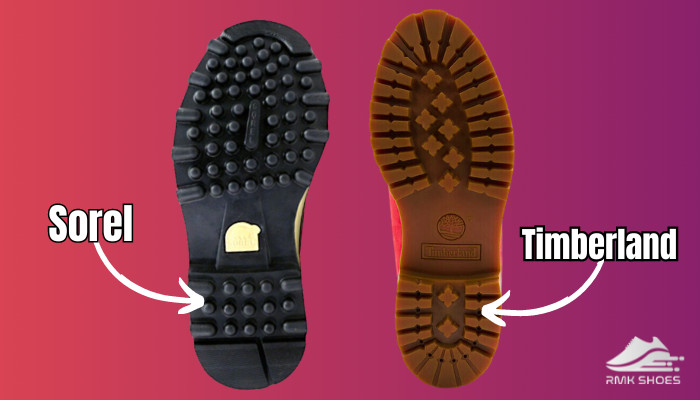
Sorel and Timberland have their unique technologies for their sole unit. I personally like the sustainable approach of Timberland, and Sorel also incorporates recycled materials in some of their models.
8. Design and Style Variety
Sorel boots boast a rugged and outdoorsy vibe, ideal for embracing nature or casual strolls. With a variety of styles, they embody a classic and timeless charm characterized by leather uppers, lace-up closures, and bold stitching.
Their sturdy appearance radiates durability and dependability. Sorel presents an extensive array of colors and finishes, ensuring you can discover a pair that resonates with your personal style.
Conversely, Timberland boots showcase urban and versatile designs suitable for diverse occasions, from hiking trails to city tours. Sporting a sleek and contemporary aesthetic, they feature clean lines, smooth leather uppers, and minimalist details.
Timberland offers a broad spectrum of colors, from classic neutrals to trendy hues, enabling you to express your unique identity.
Timberland offers an extensive collection of styles, allowing you to effortlessly select your desired footwear options based on your preferences.
9. Weight and Size
Sorel boots often weigh a bit more compared to Timberland boots, as they prioritize durability and sturdiness in their designs. This focus on resilience may contribute to the slightly heavier feel of Sorel boots.
However, this weight translates into excellent protection and insulation, ideal for harsh and challenging environments.
Conversely, Timberland boots generally lean towards being lighter in weight.
They emphasize crafting footwear that looks stylish and offers comfort for everyday use.
Their boots are engineered to be versatile and lightweight, promoting easy movement and all-day wearability. Timberland balances durability and weight, ensuring suitability for a range of activities and settings.
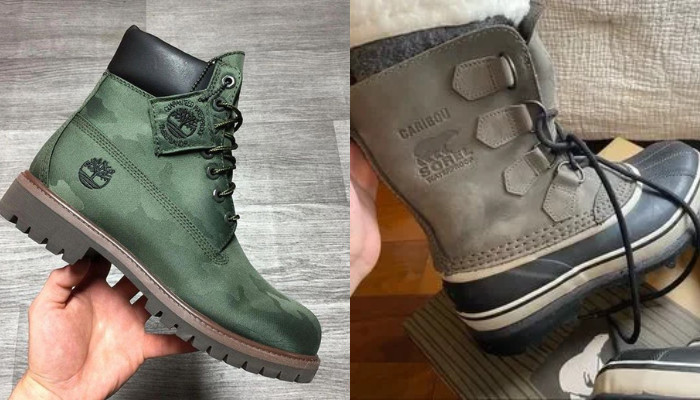
When it comes to sizing, there’s a distinction in fit between Sorel and Timberland boots. Sorel boots typically run true to size, allowing you to confidently select your regular shoe size.
In contrast, Timberland boots often run slightly larger, so it’s advisable to opt for half a size down when choosing your Timberland size.
10. Price Evaluation
Sorel’s winter boots typically range from $105 to $200. This puts them at the competitive end of the spectrum, especially considering their focus on warmth and durability.
I bought a pair of Sorels several years ago, and they’ve held up incredibly well, making them a good value long-term.
Timberland’s winter boots generally fall within the $110 to $260 range. Their emphasis on premium materials and iconic styling can translate to a slightly higher price tag.
However, their boots are known to last for years, potentially making them a worthwhile investment. I own a pair of Timberlands that I wear almost every winter, and they still look amazing, making them a cost-effective choice in the long run.
Price-wise, Sorel is a clear winner. Not only are their products slightly more affordable compared to Timberland, but they also offer exceptional value for the money.
Benefits and Drawbacks of Sorel and Timberland
When discussing outdoor footwear, Sorel and Timberland emerge as distinct brands, each with its own set of strengths and weaknesses.
Here are some essential points to keep in mind:
Sorel
- »Ideal for extreme cold with thick felt and sealed construction.
- »Grippy treads are perfect for winter adventures.
- »Built to last with heavy-duty materials.
- »Good value for warmth and durability.
- »Less flexible and slightly heavier than some Timberlands.
- »Thick insulation might feel hot for milder winters.
Timberland
- »Good for various winter conditions.
- »Balanced traction on different terrains.
- »Suitable for everyday and light outdoor use.
- »Classic work boots to trendy designs.
- »High-quality leather and durable construction.
- »Might not be ideal for extreme cold compared to Sorel.
- »Premium materials and brand recognition can cost more.
Sorel vs Timberland: Which offers the Best Winter & Snow Boots?
Sorel excels in extreme cold conditions, delivering top-tier warmth with its thick felt liners and durable materials. Its rugged treads tackle icy terrains effortlessly, promising durability and value, although they may feel a bit bulky and less fashionable.
On the other hand, Timberland showcases its adaptability, offering boots with moderate warmth suitable for varied winter conditions.
With a diverse array of styles, from classic to trendy, and premium materials ensuring longevity, Timberland caters to various preferences.
Ultimately, if your priority is battling extreme winter conditions, Sorel is undoubtedly the go-to option. But I will also suggest you consider Timberland’s versatility.
FAQs
Which brand, Sorel or Timberland, performs better in extreme cold weather?
Sorel stands out as an exceptional footwear brand renowned for its unparalleled insulation and exceptional warmth. Sorel boots are engineered to endure harsh and cold climates, making them a trusted choice for reliable and cozy footwear in extreme weather.
Sorel or Timberland, which offers a greater variety of styles and designs?
Timberland offers a broader selection of styles and designs, catering to diverse fashion preferences. With options ranging from classic to trendy, you can easily find a boot that matches your style.
Which brand, Sorel or Timberland, is more affordable?
Sorel typically offers competitive prices, making their products more accessible to a wider range of consumers. Their pricing strategy allows them to appeal to budget-conscious individuals while maintaining a reputation for durability and functionality.
Are Sorel boots true to size?
Sorel boots are generally true to size, so it’s advisable to select your regular size. Additionally, referring to the brand’s sizing guide can provide accurate measurements for a better fit.

